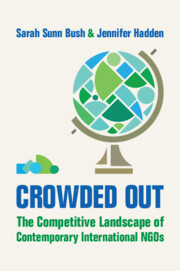4 - The Growing Specialization of INGOs
Published online by Cambridge University Press: 24 May 2025
Summary
Why are American INGOs’ missions becoming narrower while global issues are arguably becoming more expansive and interconnected? This chapter argues that mission specialization is a response to growing population density. As many INGO sectors became denser, more concentrated, and more competitive in the early 2000s, entrepreneurs began seeking ways to distinguish their new organizations. Creating an organization with a specialized mission was one way to survive in a crowded sector and thus became a common strategy. We support this argument with an analysis of original data on American INGOs’ mission statements. A case study of humanitarian INGOs further illustrates the value of our approach.
Keywords
Information
- Type
- Chapter
- Information
- Crowded OutThe Competitive Landscape of Contemporary International NGOs, pp. 85 - 123Publisher: Cambridge University PressPrint publication year: 2025
- Creative Commons
- This content is Open Access and distributed under the terms of the Creative Commons Attribution licence CC-BY-NC 4.0 https://creativecommons.org/cclicenses/
